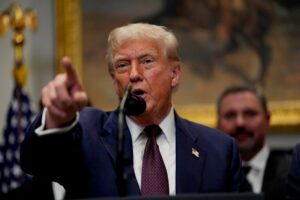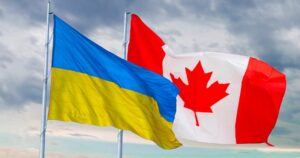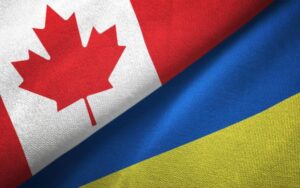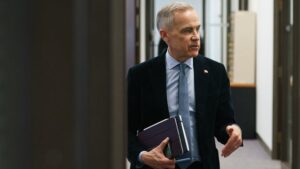
US President Donald Trump has signed an executive order raising tariffs on imports from Canada from 25% to 35% as part of efforts to combat the flow of illegal drugs across the northern border. The new tariffs will take effect on August 1, 2025, according to the White House’s official website.
According to the administration, the decision was made against the backdrop of “Canada’s persistent failure to arrest drug traffickers, seize illegal drugs, or coordinate with U.S. law enforcement agencies.”
“The president’s further actions are necessary and appropriate to protect the lives of Americans, as well as the national security and foreign policy of the United States of America,” the statement said.
The White House recalled that Trump declared a state of emergency under the International Emergency Economic Powers Act (IEEPA) in response to the crisis caused by fentanyl and other illegal drugs.
The preferential treatment for goods covered by the US-Mexico-Canada Agreement (USMCA) remains in place. At the same time, goods that are transshipped to avoid the new tariff will be subject to a separate 40% transshipment duty.
It is noted that in this fiscal year alone, more fentanyl has been seized at the northern border of the United States than in the previous three years combined.

Decree No. 529/2025 appointed Andriy Plakhotniuk Ambassador Extraordinary and Plenipotentiary of Ukraine to Canada and Permanent Representative to the International Civil Aviation Organization (ICAO).
Prior to this appointment, Mr. Plakhotniuk served as Ambassador Extraordinary and Plenipotentiary of Ukraine to Sweden since 2021. Previously, he worked in the Ministry of Foreign Affairs of Ukraine, in particular in the Department of International Organizations and embassies abroad.
He holds a PhD in Political Science and is fluent in several foreign languages. Andriy Plakhotniuk is known for his active position in promoting Ukraine’s Euro-Atlantic integration and strengthening bilateral cooperation in defense and high technology.
Diplomatic relations between Ukraine and Canada were established on January 27, 1992.
Ukraine has one of the largest Ukrainian embassies in the world in Canada, and more than 1.3 million Ukrainians and their descendants live in the country.

Canadian Minister of Finance and National Revenue François-Philippe Champagne announced that Canada will extend the Order exempting Ukrainian goods from duties until June 9, 2026, according to the Canadian government’s website
“Canada remains unwavering in its support for Ukraine as it fights to defend its sovereignty, territorial integrity, and democracy. The conflict, initiated by Russia with the support of Belarus, continues to seriously affect Ukraine’s economy, including its ability to export goods to global markets,” the Canadian Ministry of Finance said in a press release. The document recalls that last month in Banff, Alberta, G7 finance ministers and central bank governors unanimously reaffirmed their unwavering support for Ukraine.
“Canada continues to support Ukraine’s economy by extending duty-free access for Ukrainian goods to Canada for one year,” the statement said.
Since the issuance of the Order exempting goods from Ukraine from duties on June 9, 2022, Canada has imported more than $35 million worth of these goods, with $8.5 million in customs payments waived. It is expected that approximately $1.2 million in customs duties will be refunded between June 10, 2025, and June 9, 2026.
The order exempting Ukrainian goods from customs duties came into force on June 9, 2022, for an initial period of one year, after which it was extended annually. The order temporarily suspends customs duties on imports of Ukrainian goods.

The State Service of Ukraine for Food Safety and Consumer Protection has approved the form of an international certificate for the export of table eggs to Canada, the press service of the Union of Poultry Breeders of Ukraine reports.
“Please note that eggs can only be exported to Canada in cooperation with licensed importers in Canada, who must have a valid SFC (Safe Food for Canadians License),” the agency said.
The form of the certificate is available on the official web portal of the State Service of Ukraine on Food Safety and Consumer Protection in the section “International Cooperation” in the section “Certificates for export from Ukraine”.
The agency’s website also contains additional information on compliance with Canadian legislation by producers of table eggs and egg products, in particular on the storage and transportation of eggs and egg products, labeling of eggs and egg products, salmonellosis control program – egg products, salmonellosis control program – table eggs, requirements for egg sorting, and identification standards.

The leader of the Conservative Party of Canada, Pierre Poilievre, said that his future government would transfer frozen Russian assets worth $22 billion to Ukraine, the official website of the Conservative Party of Canada reported on Friday.
According to Poilievre, these funds will be used to support Ukraine in its fight against Russian aggression, as well as to restore infrastructure after the destruction caused by the war.
“The Conservatives have always been proud to support our Ukrainian allies… The Conservatives were the first to introduce the Sergei Magnitsky Act, which made it possible to impose sanctions on Russian oligarchs after Putin’s illegal and unprovoked invasion of Crimea,” Poilievre said.
He reminded that Moscow’s war against Ukraine did not begin in 2022, but almost eight years earlier. After that, the Conservative government of Stephen Harper sent troops to Ukraine as part of Operation UNIFIER and helped to expel Russia from the G8.
Poillevre criticized the current Liberal government for its inaction on the transfer of frozen assets, emphasizing that the Conservatives would act quickly.
“Three hours after the start of the full-scale Russian invasion of Ukraine, I spoke at a rally of the Ukrainian community in Ottawa: ‘Canadians stand in full solidarity with you, and we will always be with you. Three years later, our commitment has not wavered. Glory to Ukraine,” Poilievre said.
Early parliamentary elections in Canada are scheduled for April 28. The Conservatives are currently in opposition.
Earlier, the Experts Club think tank released a video analysis on the most important elections in the world in 2025, see more here – https://youtu.be/u1NMbFCCRx0?si=vtEMJXzfMcggWsD2
Source: https://interfax.com.ua/

Canadian Prime Minister Mark Carney announced the dissolution of parliament on Sunday and new elections on April 28.
“I have just asked the Governor General to dissolve parliament and call a federal election on April 28,” he wrote on social media site X.
“We must build the strongest economy in the G7. We must deal with President Trump’s tariffs. Canadians deserve a choice about who should lead these efforts for our country,” the prime minister emphasized.
Earlier, Experts Club and Maksim Urakin released a video analysis on the most important elections in the world in 2025 – https://youtu.be/u1NMbFCCRx0?si=AOtHGDT1kGNdZd2g